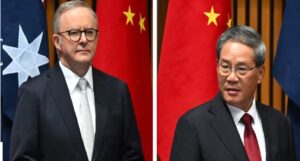Chinese Premier’s Visit to Australia: Diplomatic Gestures and Media Controversy
Chinese Premier Li Qiang’s historic visit to Australia signals improved bilateral relations amid controversy over media access for detained journalist Cheng Lei. Prime Minister Albanese emphasizes dialogue and cooperation despite protests during ceremonial events in Canberra.
CONTENTS:
- Chinese premier’s visit to Australia
- Li Qiang and Albanese face protesters
- Cheng Lei’s media access challenged

Chinese premier’s visit to Australia
During Chinese Premier Li Qiang’s visit to Canberra, the Australian government extended a warm welcome, marking the first trip by a Chinese premier to Australia in seven years. The visit underscored a significant improvement in the previously strained bilateral relationship.
Prime Minister Anthony Albanese emphasized the importance of mature dialogue between the two nations during the official events in the nation’s capital. While acknowledging the progress made, Albanese also asserted that disagreements between Australia and China cannot simply be ignored or shelved.
The visit was not without controversy, as Chinese officials reportedly attempted to obstruct the view of Australian journalist Cheng Lei, who had been detained previously, during a signing ceremony. This incident somewhat overshadowed the diplomatic gestures aimed at improving ties between the two countries.
Li Qiang and Albanese face protesters
During the ceremonial welcome at Parliament House in Canberra, Chinese Premier Li Qiang and Australian Prime Minister Anthony Albanese stood on a platform facing outward. From there, they could observe two distinct groups gathered approximately 200 meters away on the lawns.
One group, supportive of Li’s visit, included individuals waving both Chinese and Australian flags. Meanwhile, another group held Tibetan flags and protested the visit, citing human rights concerns. Chants of “Free Tibet” could be heard from the anti-visit demonstrators, who also displayed a large sign demanding human rights, mentioning Uyghurs, Tibet, Hong Kong, and China.
Following their annual leaders’ meeting, Albanese and Li attended a media event where government officials and ministers signed several agreements. These included commitments to deepen economic dialogue and enhance cooperation on addressing the climate crisis.
Cheng Lei, who had been detained in China under vague national security charges starting in 2020 before being released late last year, participated in the event in her capacity as a presenter and reporter for Sky News Australia.
Cheng Lei’s media access challenged
Cheng Lei joined other Australian journalists in designated seats reserved for media representatives. During the signing of agreements, a Chinese embassy official positioned themselves in front of Cheng, facing the official proceedings.
Cheng Lei, speaking to Sky News, expressed her belief that Chinese officials were attempting to prevent her from making any statements or actions they deemed unfavorable, which she considered to be detrimental to their image. She contrasted the courteous behavior of Australian officials with what she described as Chinese embassy officials exceeding acceptable norms of conduct.
Cheng described the situation as a distraction during the event, preventing her and other journalists from focusing on reporting the details of the announcements.
The Chinese embassy was approached for comment regarding the incident.
During a state lunch in the Great Hall of Parliament House, Chinese Premier Li Qiang was honored, and Prime Minister Albanese emphasized the importance of direct engagement for ensuring a secure and stable region.
Check out TimesWordle.com for all the latest news
You must be logged in to post a comment.